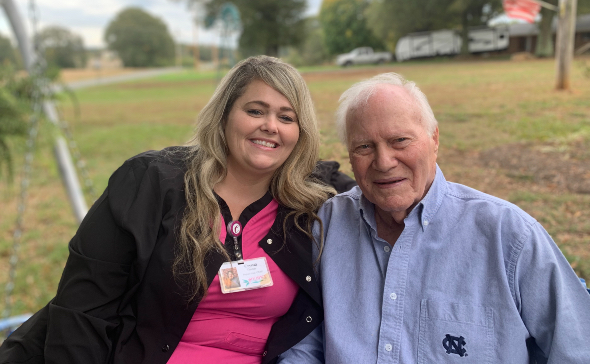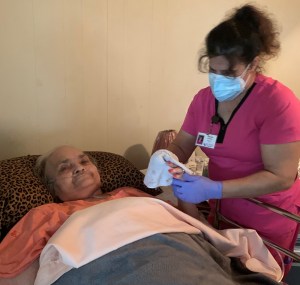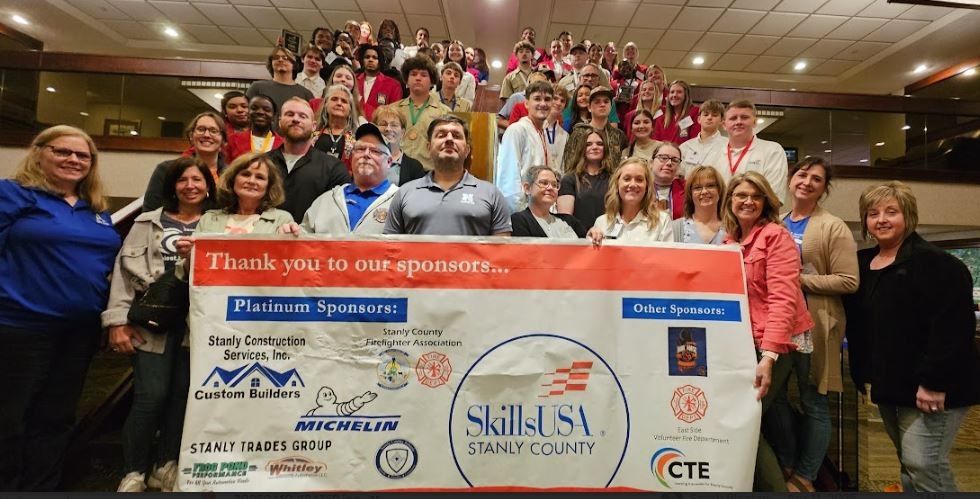Hospice celebrates 40 years of care in Stanly, surrounding area
Published 10:48 am Sunday, December 5, 2021

- Tommy Whitley of Oakboro with Crystal Thomas, a certified nursing assistant with Hospice of Stanly. Photo courtesy of Shields Howard.
|
Getting your Trinity Audio player ready...
|
Dealing with sick family members is never easy and can often be fraught with challenges. It’s especially hard when trying to make decisions for loved ones battling incurable diseases, who’s life expectancy is measured in months, if not weeks, or sometimes even days.
One saving grace for many families in Stanly County over the decades has been Hospice of Stanly & the Uwharrie, a nonprofit organization that has provided quality and compassionate end-of-life care for patients and their loved ones since 1981. With the help of staff and volunteers, many patients have been able to live comfortably in their homes surrounded by their families instead of being hospitalized or placed in long-term care facilities.
The organization, which has served more than 6,600 patients, is celebrating quite the milestone this year: 40 years of service to the community.
“I think it’s a tremendous achievement and I think it speaks to the commitment of not only the staff and the board of directors within our agency, but also to the community for their support and the commitment to make sure the agency still exists,” said Executive Director Lori Thayer, who has been with the organization since 2012.
“I’m a big fan of Hospice and what Hospice does and what they mean to the community,” added County Commissioner Scott Efird, chairman of the nonprofit’s Board of Directors. “The staff, from the executive director to the leadership team to the nurses, they just do a tremendous job in the community.”

Theresa Speedling, a CNA, works with patient Dora Love. Photo courtesy of Shields Howard.
To put the anniversary in proper historical context, the Stanly News & Press interviewed former and current staff members, along with volunteers and individuals impacted by Hospice, to learn what it has meant to them over all these years.
Providing care and comfort for families
Becki Rice first heard about Hospice of Stanly after one of her friends had a positive experience dealing with the organization.
“We knew absolutely nothing about Hospice at the time my dad got sick,” Rice said.
But once her family contacted Hospice about eight years ago, she said her father, Keith Rice, fell in love with the staff and even referred to the girls as “his angels.”
The organization also took care of Rice’s mother, Hazel, who was in Hospice care for about six weeks before she died at the end of January.
But the decision for a family to acknowledge their loved one has regressed to a point where they need end-of-life care is not easy — and it certainly was hard for Rice and her siblings.
“It was difficult, but we knew in our hearts that it was the right thing to do for out parents,” she said.
Both Rice’s mom and dad wanted to be at home during their final weeks instead of being placed in a facility.
“Hospice just seemed to be the perfect answer to our prayers,” she said.
Rice thinks her parents were able to live longer by being cared for at home compared to if they had to go somewhere else like a long-term care facility.
Hospice staff came multiple times to the house, helping with things like giving her parents a bath, administering medication and helping them walk around. One of the aides even prayed with her father, which he told Rice was “the most beautiful prayer I had ever heard.”
Rice remembers the first time hospice aide Alicia McKinnon arrived at the home to give Hazel a bath. Her mom initially protested, but Rice told her to be patient. Afterwards, Rice recalled that her mom was impressed.
“She really knew what she was doing,” she remembers her mom told her. “When is she going to do that again?”
After her mother died, Rice had about three months of bereavement care, where Michaele Conners, a bereavement counselor, regularly came out to talk with her and help her process what occurred.
“She was so understanding,” Rice said. “She knew exactly what I was going through.”
An especially touching moment occurred when Conners inquired if Rice had an article of her parent’s clothing she could have. Rice gave Conners her mother’s Christmas vest and her father’s sports jacket. A custom-made teddy bear was then created from the fabric and it sits beside her mother’s favorite chair. It’s one of many so-called memory bears the organization has made for family members to remember their loved ones.

Becki Rice’s memory bear was created with fabric from her mother’s black vest and her father’s sports jacket. Photo courtesy of Shields Howard.
Even more than half a year after her mother died, Rice said Conners still reaches out to her “just to say hello and see how I’m doing.”
As part of the organization’s bereavement program, counselors provide grief support to all family members for at least 13 months after their loved ones have died.
With all the many moments they have shared together over the years helping with both her parents, Rice views the staff at Hospice of Stanly & the Uwharrie as part of her family.
Pam Holbrook has also been part of the Hospice family for more than 30 years as a volunteer, one of 55 currently helping within the organization. She was inspired to work for the organization after watching Hospice of Anson County care for her father, who was battling pancreatic cancer. Her father was told he had between two to six months to live, but thanks to the care of the staff, her father lived for 18 months.
“I realized how important they were and what a wonderful organization they were,” Holbrook said.
At the time, she lived in Stanly and so as a way to give back, she took training courses to become a hospice volunteer in the late 1980s. Her responsibilities included visiting families, taking meals to them and taking patients to treatment or to see their doctor, though volunteers no longer provide that specific service, she said.
“I had some wonderful experiences doing that,” said Holbrook, who after more than 30 years of service including 5,000 hours of volunteering, was honored this past spring with the organization’s Volunteer Lifetime Achievement Honor. “I felt like I received so much more from those patients and their families than I could ever possibly give to them as a volunteer.”
The origins of the organization
Hospice of Stanly County was first incorporated in 1981 after support from both the Stanly County Medical Society and the Stanly County Ministerial Association, according to historical information provided by Shields Howard, the organization’s marketing director.
An initial meeting, sponsored by the ministerial association, was held in March at the Stanly County Courthouse to gauge community interest in creating a hospice program. About 90 people attended the event. Rev. George H.V. Hunter, minister of First Presbyterian Church in Albemarle, spoke of the importance of establishing a local program to help the terminally ill and their families.
“Folks need to have the opportunity to live fully until they die,” he said, according to a local newspaper article, “and to live at home until then. We’re trying to make it possible for ‘papa’ to die at home without pain and to make it possible for ‘mama’ to have help so ‘papa’ can die at home in his own bed.”
A month later, a hospice steering committee was formed during a meeting at First Presbyterian Church. Several decisions were made, including that care would be limited to cancer patients and the scope of the organization be focused on caring for residents exclusively in Stanly. Hunter, along with Sue Massey, who worked at Piedmont Area Mental Health Centers, were elected as co-chairpersons of the committee.
By the summer of 1981, an application for a charter as a nonprofit organization was submitted to the state for approval. Bylaws were adopted and a board of directors were appointed, with Massey being elected the first president of Hospice of Stanly County, according to a 1992 SNAP story highlighting the 10-year anniversary of the organization.
The first patients were accepted into the hospice program, which was originally located in the basement of Main Street United Methodist Church, on Nov. 16 1982.
For much of the 1980s and 1990s, the organization gradually began to grow and expand its operations. Rachel Goins was executive director from 1988-1994 and during her tenure, Hospice was approved for Medicare and Medicaid certification and the organization broadened its operations to serve people with non-cancer related ailments such as AIDS and Alzheimer’s disease.
“Most people believe that hospice care is directly related to cancer and that’s not so. It wasn’t for us,” said Goins, who had previously volunteered her time at hospitals in Stanly and other areas where she had lived. “We broadened the scope into other terminal illnesses.”
Goins helped increase the organization’s financial base by requesting funds from the United Way and applying for grants on behalf of patients who did not qualify for Medicare or Medicaid. She also organized a speakers bureau to meet with local citizens and began recruiting people to serve on the board of directors.
The hospice program, which was initially made up almost entirely of volunteers, expanded over the first decade to comprise 14 staff members by 1992, including four nurses, three home health aides, a family support coordinator and a medical director, among others.
Goins calls her time as director “the most rewarding experience in my working career” because she was part of an organization that provided key support for families during some of their toughest moments.
“It just gave you faith and hope to know that you had helped people who at the end needed the services,” she said. “It gave me a great deal of inner satisfaction to know that I was a part of that.”
After holding offices throughout the county, including in Stanly Memorial Hospital and the health department, the organization moved into a new office at 960 N. First St. in December 1995, where it’s been ever since. In 2014, to be more inclusive of its service area, the organization changed its name to Hospice of Stanly & the Uwharrie.
The organization currently serves people up to an hour away from Stanly County. Though the overwhelming majority of patients are from Stanly, during 2021 the organization has served people in Anson, Montgomery, Rowan and Cabarrus counties.
‘We do the Lord’s work’
Beth Thomas began her career working as a social worker at Richmond Memorial Hospital for about 10 years before she felt a strong calling to return to her home county and help patients with Hospice of Stanly.
“I was giving 110 percent to their community, but I knew I wanted to come back and be available and serve the patients and families of my community,” said Thomas, who left her job at the hospital for Hospice in 2005.
Sixteen years later, Thomas, who is the family services manager and a social worker, is now the longest-tenured staff member with Hospice. She oversees the other two social workers, two bereavement coordinators and a chaplain.
“That’s where the Lord called me,” Thomas said, noting that hospice work is a calling. “We do the Lord’s work.”
For Thomas and the other social workers, responsibilities include providing emotional support to patients and their families and assisting with caregiving needs, such as if patients have to be placed in a facility.
During her career with Hospice, Thomas has seen a gradual increase in the number of patients the organization helps on a daily basis. When she started in 2005, she said the average number of daily patients fluctuated between around 28 to 38; the organization is currently providing care for an average of between 66 to 68 patients each day.
While the majority of patients are 55 and older, the organization serves people 18 and up. Thomas recalls that the youngest patient she’s ever worked with was in their early 20s.
A small portion of the patient population over the past year and a half has been people that had contracted the coronavirus, though usually they have other comorbidities such as cancer or lung disease.
“So once traditional medicine was not working and families made the decision to bring their loved one home with Hospice we have cared for some of those that had had the Covid pneumonia and ended up passing away in their homes,” Thomas said.
Some of the many community events the organization typically hosts includes the Hospice Golf Tournament, the Angel Tree Lighting ceremony and the Festival of Trees at Stanly Commons. Other key events include Camp Forget-Me-Not, a free bereavement day camp for children ages 6-17 and their families, and Hope Blooms, where people learn more about grief.
While the Hospice of Stanly has changed and the number of patients has increased over the years, what has stayed constant is the organization’s mission of providing high-quality care and compassion towards its patients and their families.
“Things change in management, but in the end our goal does not change because we want to serve our community with the best care we can,” Thomas said.
Even with the big milestone, Hospice of Stanly has no plans to slow down.
“I hope we can be here 40 more,” said Thayer. “That’s the plan.”






